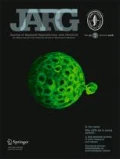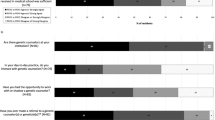Abstract
Purpose
The purpose of this observational survey study is to assess genetic knowledge in reproductive-aged women and to determine the role played by their obstetricians in their education.
Methods
A 31-item survey was distributed via an internet survey service to women between the ages of 18 and 45. The survey included subject demographics, a query regarding the source of subjects’ knowledge of genetics, and 6 question genetics quiz with 3 fundamental questions and 3 advanced questions. Subjects were divided into parous and nulliparous groups, and responses were compared using student’s t-test for continuous variables and chi square for proportions.
Results
Participants included 207 parous and 221 nulliparous women. There were no differences in demographic characteristics including age and education. Parous women scored significantly higher than nulliparous women on the fundamental genetics quiz (71 vs 61 %, p = 0.03). This difference remained but was no longer significant when the 3 advanced questions were included (48 vs 42 %). Only 39 % of parous and 8 % of nulliparous subjects listed their physician as one of their main sources of genetic information. 78 % of all subjects stated that they would prefer to receive genetic information from their physicians over other sources.
Conclusions
Recently parous women scored higher on a genetics assessment quiz than did their nulliparous counterparts, but the majority did not cite their obstetrician gynecologists as a main source of information. As genetic counseling and testing are becoming increasingly important aspects of obstetrical care, obstetricians should play a more substantial role in educating their patients.
Similar content being viewed by others
References
American College of Obstetricians and Gynecologists. ACOG Committee Opinion number 313. The importance of preconception care in the continuum of women’s health care. Obstet Gynecol. 2005;106:665–6.
American College of Obstetricians and Gynecologists Committee on Genetics. Committee opinion no. 478: family history as a risk assessment tool. Obstet Gynecol. 2011;117:747–50.
Solomon BD, Jack BW, Feero WG. The clinical content of preconception care: genetics and genomics. Am J Obstet Gynecol. 2008;199:S340–4.
ACOG Committee on Obstetrics. ACOG practice bulletin no. 78: hemoglobinopathies in pregnancy. Obstet Gynecol. 2007;109:229–37.
ACOG Committee on Genetics. ACOG committee opinion no. 442: preconception and prenatal carrier screening for genetic diseases in individuals of eastern European Jewish descent. Obstet Gynecol. 2009;114:950–3.
American College of Obstetricians and Gynecologists Committee on Genetics. ACOG committee opinion no. 486: update on carrier screening for cystic fibrosis. Obstet Gynecol. 2011;117:1028.
Wilkins-Haug L, Erickson K, Hill L, Power M, Holzman GB, Schulkin J. Obstetrician-gynecologists’ opinions and attitudes on the role of genetics in women’s health. J Womens Health Gend Based Med. 2000;9:873–9.
Wilkins-Haug L, Hill L, Schmidt L, Holzman GB, Schulkin J. Genetics in obstetricians’ offices: a survey study. Obstet Gynecol. 1999;93:642–7.
Faden RR, Chwalow AJ, Orel-Crosby E, Holtzman NA, Chase GA, Leonard CO. What participants understand about a maternal serum alpha-fetoprotein screening program. Am J Public Health. 1985;75:1381–4.
Parsons EP, Clarke AJ. Genetic risk: women’s understanding of carrier risks in Duchenne muscular dystrophy. J Med Genet. 1993;30:562–6.
Sorenson JR, Swazey JP, Scotch NA. Reproductive pasts. Reproductive futures. Genetic counseling and its effectiveness, Birth defects: original article series XVII. New York: Alan R. Liss Inc; 1981. p. 84–8.
Whitten CF, Thomas JT, Nishiura EN. Sickle cell trait counseling-evaluation of counselors and counselees. Am J Hum Genet. 1981;33:802–16.
Radford C, Prince A, Lewis K, Pal T. Factors that impact the delivery of genetic risk assessment services focused on inherited cancer genomics: expanding the role and reach of certified genetics professionals. J Genet Couns. 2014;23:522–30.
Skirton H, Goldsmith L, Jackson L, O’Connor A. Direct to consumer genetic testing: a systematic review of position statements, policies and recommendations. Clin Genet. 2012;82:210–8.
Compliance with Ethical Standards
Conflicts of Interest: John E Buster is the medical director of Previvogententics LLP and a shareholder in that company. Previvogenetics is a medical device company applicable to the field of genetic diagnosis. All procedures performed in studies involving human participants were in accordance with the ethical standards of the institutional and/or national research committee and with the 1964 Helsinki declaration and its later amendments or comparable ethical standards. Informed consent was obtained from all individual participants included in the study.
Funding
Funding provided by divisional funds from the Division of Reproductive Endocrinology and Infertility in the Department of OB/GYN at Women and Infants Hospital
Author information
Authors and Affiliations
Corresponding author
Additional information
Capsule Parous women score higher on a genetics assessment quiz than nulliparous women but do not site their obstetricians as a source of their genetic knowledge.
APPENDIX A
APPENDIX A
Quiz Questions
-
1.
If neither you nor your partner has been diagnosed with a genetic disease, is it possible for your children to inherit one?
-
a.
Yes
-
b.
No
-
c.
Don't know
-
a.
-
2.
How is Cystic Fibrosis most commonly transmitted?
-
a.
Direct contact with an affected person
-
b.
Inherited from parents
-
c.
Environmental exposures
-
d.
It is not known
-
e.
Don't know
-
a.
-
3.
What kind of test is typically used to determine if someone is a carrier for sickle cell anemia?
-
a.
Blood
-
b.
Urine
-
c.
X-ray
-
d.
Bone marrow biopsy
-
e.
Don't know
-
a.
-
4.
Disease X is inherited in an autosomal recessive fashion. If 2 partners are both silent carriers for disease X and they have a child together, what is the likelihood that child will have disease X?
-
a.
100%
-
b.
50%
-
c.
25%
-
d.
10%
-
e.
Don't know
-
a.
-
5.
To your konwledge, is there a way to avoid pregnancy affected by genetic disease X if both partners are silent carriers and they wish to have a child that is biologically theirs?
-
a.
Yes
-
b.
No
-
c.
Don't know
-
a.
-
6.
If two partners are both silent carriers of genetic disease X and they wish to avoid a pregnancy affected by the disease, which technology is their best option to have a child that is genetically theirs?
-
a.
Preimplantation genetic diagnosis (PGD)
-
b.
Intracytoplasmic sperm injection (ICSI)
-
c.
Intrauterine Insemination (IUI)
-
d.
Chorionic Villus Sampling (CVS)
-
e.
There is currently no way to avoid a pregnancy affected by the disease
-
f.
Don't know
Of Note: Questions 1-3 were considered fundamental, 4-6 were considered advanced. Answer choices were randomized for each respondent. Respondents could not move backwa
-
a.
Rights and permissions
About this article
Cite this article
Mandelberger, A.H., Robins, J.C., Buster, J.E. et al. Preconception counseling: do patients learn about genetics from their obstetrician gynecologists?. J Assist Reprod Genet 32, 1145–1149 (2015). https://doi.org/10.1007/s10815-015-0491-5
Received:
Accepted:
Published:
Issue Date:
DOI: https://doi.org/10.1007/s10815-015-0491-5



